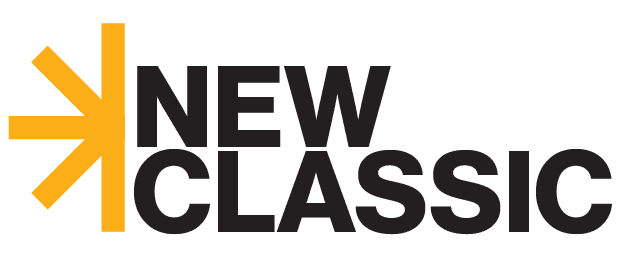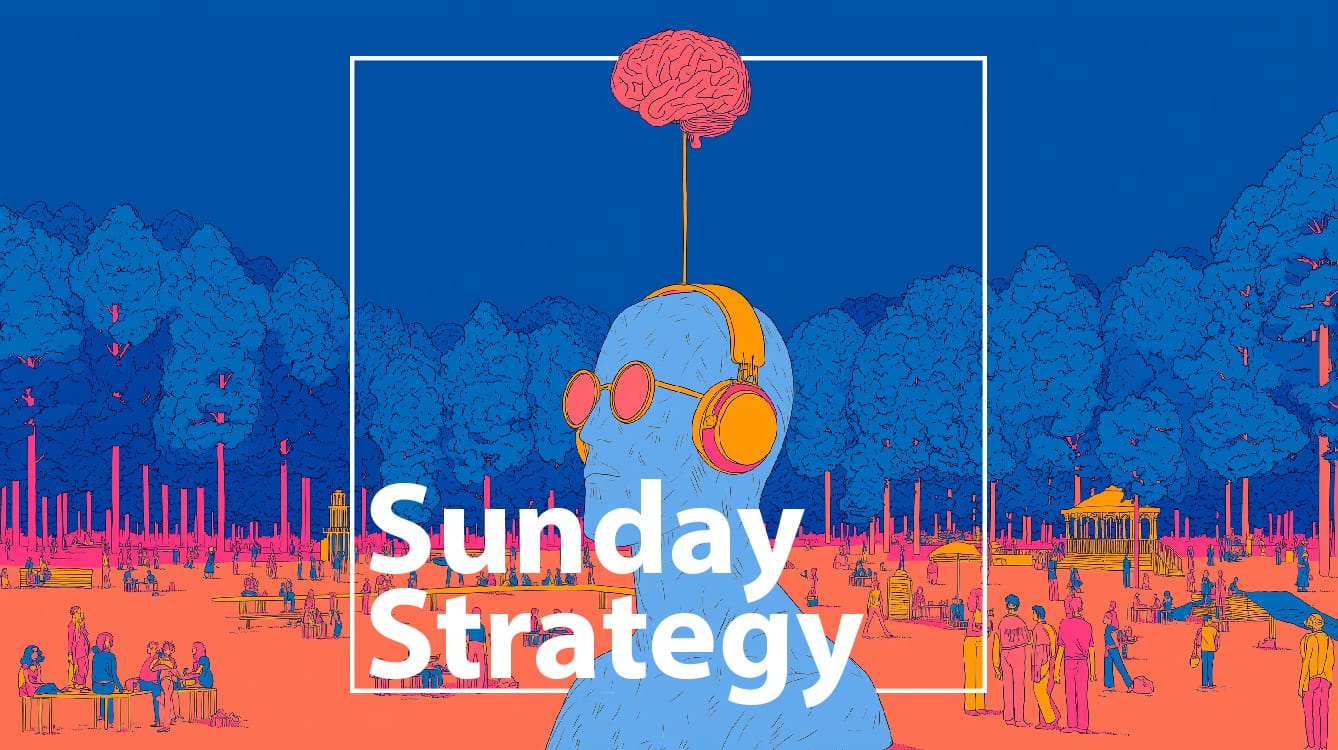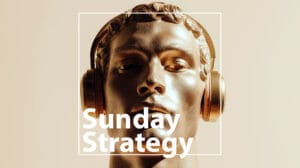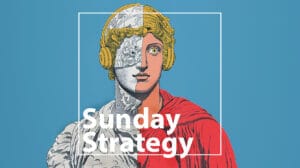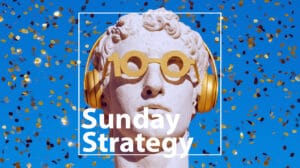In this issue of Sunday Strategy, we look at five stories to think about next week, including: Can we accept Superintelligent Assistants, The Problem with Rewards Cards, Can Every Brand Tap Into Wellness, Are Smart Glasses Fashion or Tech and the B2C Gap in B2B.
In addition, we have ads from: Skoda, Canadian Lung Association, IKEA and DirecTV.
// Stories of the Week:
1.) Can We Accept a ‘Personal Super Intelligence’ as Our Assistant?
Meta founder Mark Zuckerberg continued his AI push this week, publishing a letter about his vision for ‘personal superintelligence’. As Zuckerberg states in his letter, and in his aggressive AI hiring moves, he believes ‘super intelligence’ is in sight and wants to direct it towards making a ‘meaningful impact in each of our lives’. The vision of an intelligence, even one greater than ourselves, serving as our personal assistant is enticing, but how realistic is it?
The biggest barriers may not be technological, but psychological and behavioral. Our use of AI currently spans the gamut from admin to therapist and leader, but we’re still interacting with something that we feel, at least, partially in control of. Even with this perceived power difference, we’re starting to simultaneously see outsourcing of cognitive ownership and emerging AI slurs. We are already simultaneously reliant and afraid of AI in many instances, something AI platforms are still struggling to resolve. If this continues, does it make the foundations of a new personal partnership or are we seeing the makings of an intellectual firearm (something we accept into our lives due to the promise of protection which comes with a real risk of harm)?
2.) The Problem with Reward Credit Cards
As Chase raises the annual fee on its top tier Sapphire Reserve credit card, Citi launches the Citi Strata Elite and AMEX teases an upgrade to its Platinum card coming this fall – US luxury rewards credit cards continue to chase a higher level of reward and cost. However, with 82 cents out of every reward dollar left unused on rewards cards in 2022 and a 70% increase in reward card complaints with the CFPB vs. 2019 – is the tension between aspiration and use at a breaking point for rewards cards? With overcrowded lounges and limited access, an expanding array of benefits and benefit devaluation, is the mainstreaming of luxury cards an impossible balance for card providers?
3.) Can Every Brand Tap Into Wellness?
With a decade of ‘strong not skinny’ becoming a mantra in wellness and specifically women’s fitness, are we at a place where every brand has the right to hop on the trend? Whereas diet culture is still alive and well, despite social media backlash and bans, there is a shift continuing from deprivation to maximising wellness. With more people seeking out strength and terms like protein and pre-biotic found everywhere, where wellness is found has moved from specialist to mainstream. Where previously the domain of GNC and Holland & Barrett, retailers like Walmart have increasingly launched a greater in-store wellness offering, recently announcing the inclusion of Nutrafol and Ritual to over 50 currently listed products. With mainstream retailers laying claim to wellness, where does it leave specialists in a world of democratized wellness?
4.) Are Smart Glasses More Technology or Fashion?
Alibaba’s announcement that it plans on challenging Meta’s smart glasses, designed in partnership with Ray-Ban, isn’t surprising. They have a robust technical ecosystem and a user base that will benefit from it.
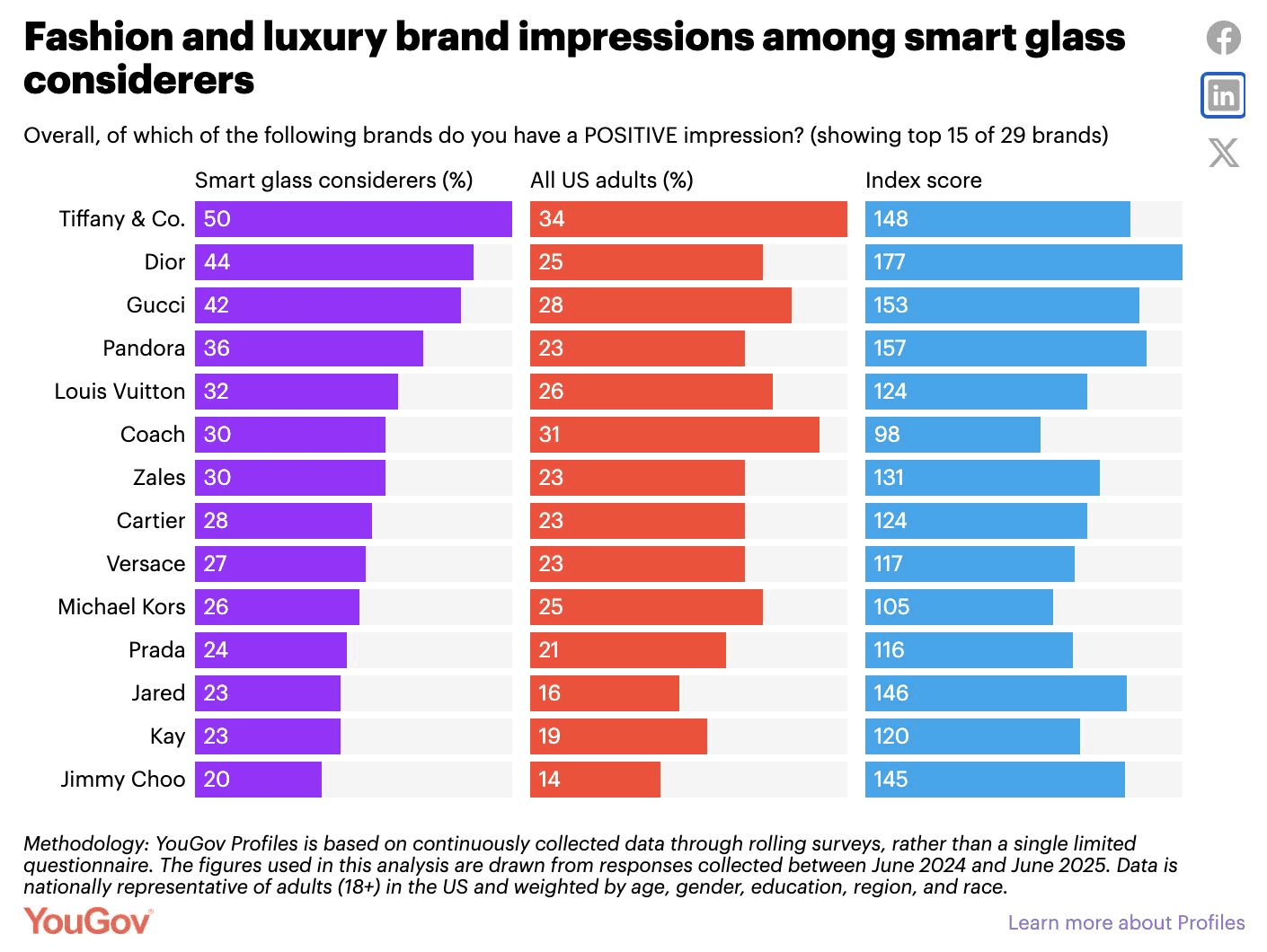

What is surprising is the lack of a fashion partner in its design. Recent YouGov research into smart glasses shows that customers considering the device in the US were much more likely to be into fashion brands – potentially a reflection of Meta’s success, but also reflecting an audience that isn’t just buying tech, they’re considering having to wear it in public.
With technology’s long history of churning out technically sound and aesthetically risky devices, is Alibaba missing a trick by not flexing a design angle? The glasses look very similar to Meta’s, so one could argue that it can draft off the competition. However, as Meta expands into partnerships with Oakley and other eyewear brands, will Alibaba’s come across as too basic?
// Chart of the Week: The B2B Headstart in Gen AI
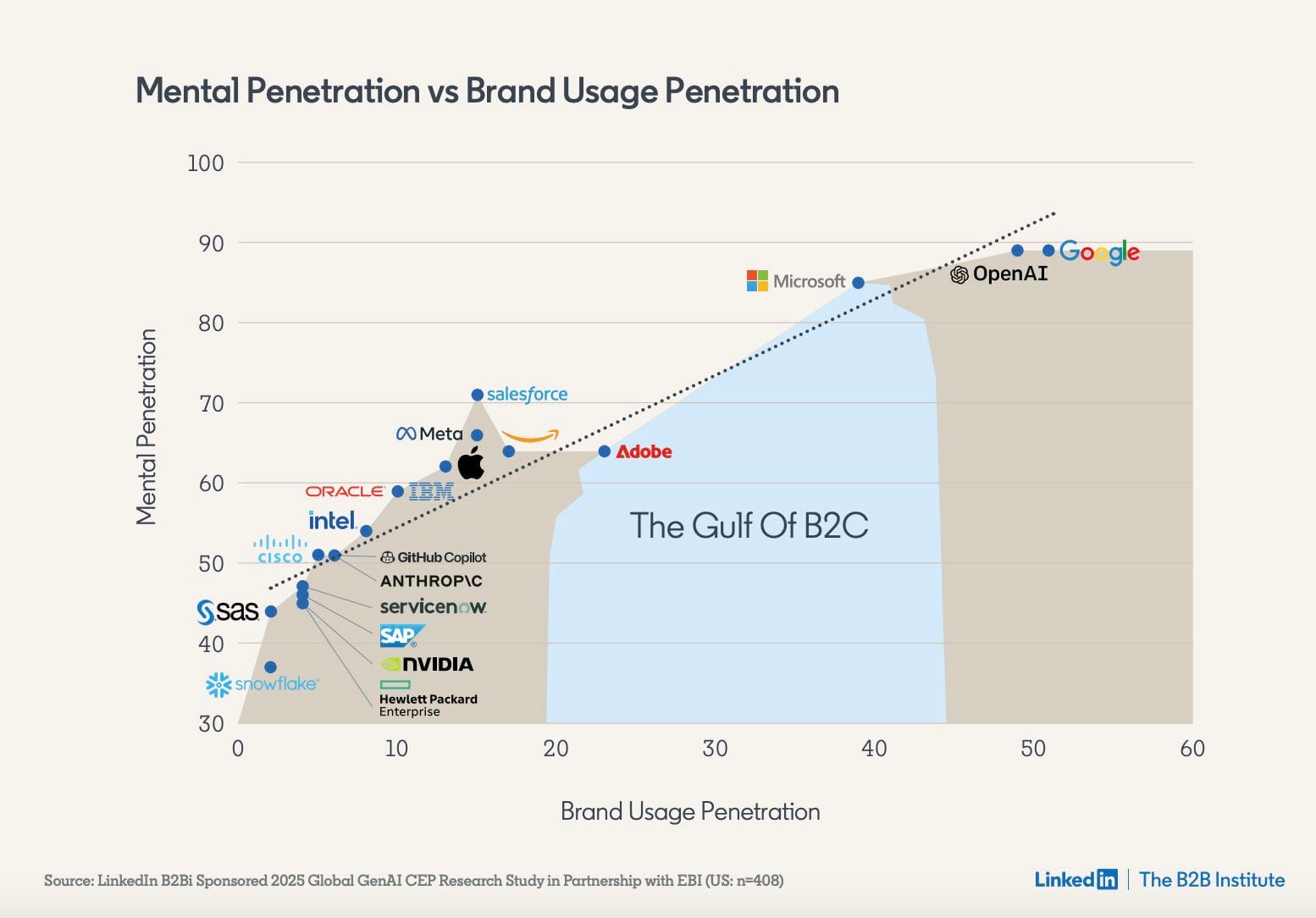

LinkedIn’s report on winning ‘Mindshare in the GenAI race’ reminds us of the power of bridging the ‘Gulf of B2C’ amongst B2B brands. Brands which have a B2C arm have a natural advantage in driving greater mental presence vs. those who have specialized in B2B.
While this specific example also leverages the long heritage of Microsoft and Google who expanded into GenAI from other technology sectors, OpenAI’s presence highlights the importance of building a holistic presence in customer’s minds. Outside of GenAI, this dynamic can also be seen by companies in retail, logistics and finance, with a consumer arm creating a gulf for hybrid brands to defend against B2B only competitors, such as Amazon and IBM.
// Ads You Might Have Missed:
1.) ‘Watch the Femmes’ – Skoda:
One of the Tour De France’s issues they’d rather keep quiet has become a jumping off point for Zwift and Skoda. ‘Anatomical Artwork’ has become a piece of the Tour as locals paint manhood based graffiti on the road, leaving the tour to use ‘eraser men’ to remove it before it appears on TV. This nuisance has become an opportunity, as this year’s graffiti has been changed by artists to promote the Tour De France Femmes. The campaign shows how an enduring problem can, with a bit of creativity, become an ingenious solution.
2.) ‘It Pays to Be First’ – Canadian Lung Association:
Big serious issues don’t always require big serious solutions. Tapping into the growing power of the comments section on social platforms, and recognizing the rituals of internet culture – the Canadian Lung Association turned simple comments into reminders to check for the symptoms of lung cancer. Borrowing from the habit of internet commenters to claim the first comment on a piece of content, the organization posted first with a reminder to be early in checking symptoms – and in the process, put health reminders in new areas of social media.
3.) ‘Sleep Talkers’ – IKEA:
IKEA Canada’s latest campaign for their mattresses lets customers’ ‘sleep do all the talking’. Reviews, recorded from sleep talkers sleeping on IKEA mattresses might not make much sense, but they humorously highlight the quality and comfort of the mattress. As IKEA go further into sleep, chasing the chance to make a greater share of the bedroom theirs, they’ve fought the forces that might keep customers awake and sold blackout blinds that double as ads – but this simple idea clearly says something about the mattresses, even if the reviews don’t make much sense.
4.) ‘DirecTV Got Hot’ – DirecTV:
In an age of streaming, legacy satellite brand DirecTV faces a challenge in convincing people it still matters. its latest campaign throws the satellite dish under the bus in an attempt to start a brand ‘glow-up’, by highlighting two actors that have had their own transformation. Kumail Nanjiani and Rob Mac (previously known as Rob McElhenney before a name change) both front a campaign claiming ‘DirecTV got hot’ while subtly referencing their own transformation. Kumail Nanjani famously beefed up for Marvel’s ‘The Eternals’, while Rob Mac (Elhenney) made a body transformation a plotline in his show ‘It’s Always Sunny in Philadelphia’.
While both spokespeople have the transformation credentials, how the brand behind them continues to do this is the open question. The ads don’t offer a clear point of differentiation from other streaming services vs. separating from its own legacy heritage. Feeling more like a social post about a month in the gym vs. the reveal of a transformation, what comes next may prove how ‘hot’ DirecTV can become.
// Sunday Snippets
// Marketing & Advertising //
// TD Bank Canada uses holes in OOH ads to feature logos of brands you can invest in [Ads]
// Grooming brand Manscaped suggests face pics over d*ck picks as they expand upwards [Ads]
// Pal’s latest ad really doubles down on hotdog puns [Ads]
// Freelance service Fiverr’s latest ads position the brand as a service when real coding is needed, claiming you can ‘Vibe Code the front end and Fiverr the back end’ [Ads]
// Pantene goes retro with ‘Country Fried Hair’ ad [Ads]
// GenZ projected to be most loyal buyers of private label goods by mid 2026 [Marketing]
// Technology & Media //
// Google rolls out video overviews for NotebookLM. Will we see a video version of the “it makes a podcast” trend? [AI]
// What is it like to be a viral trick video creator? [Social Media]
// Where do strategists stand on AI? Contribute to this year’s WARC survey to say. [AI]
// Google releases SensorLM, foundational models trained to do more with fitness and sensor data [AI]
// Runway launches Aleph, allowing greater editing capabilities and angle changes of existing footage [AI]
// A Reddit user has claimed that he’s used Claude to automate Tinder and get 10 dates in a week. No word on if Claude goes on the dates for him.
// Tomorrowland 2025 breaks records for the most popular livestream event on TikTok [Social Media]
// Inside the over 50 Brits who are leaving the BBC for YouTube [Social Media]
// TikTok has shrunk the length of songs, but artists are starting to push back [Music]
// Life & Culture //
// The gig economy has come for CEOs as well, as more c-suite take on short term gigs [Work]
// Delta Airlines is celebrating its 100th anniversary with an employee only Nike Air Force 1 [Fashion]
// UGGs male shoes division has grown by 38% this quarter vs. last year as it grows in popularity with men [Fashion]
// Skims releases shapewear for the face that looks like something from a 1900s wellness spa [Fashion]
// According to YouGov, nearly half of Americans would like to raise the driving age and lower the drinking age [Culture]
// Millennials now make up a majority of managers in the US workforce [Work]
// Mr. President examines young Londoner’s attitudes to drinking in their ‘YOLO vs. NOLO” report [Food]
// Gen Z men are 3x more likely to prioritize ‘dominance’ as a trait for men vs. boomers [Culture]
// Germany’s biggest and oldest gay nightclub, SchwuZ, declares bankruptcy [Nightlife]
// Tipping in the US has dropped to a six year low on average [Finance]
// Until Next Sunday
As always, let me know what you think by email (dubose@newclassic.agency), website or on LinkedIn.You can also listen to an audio summary and discussion of each week’s newsletter on Spotify. We’re also on TikTok!
